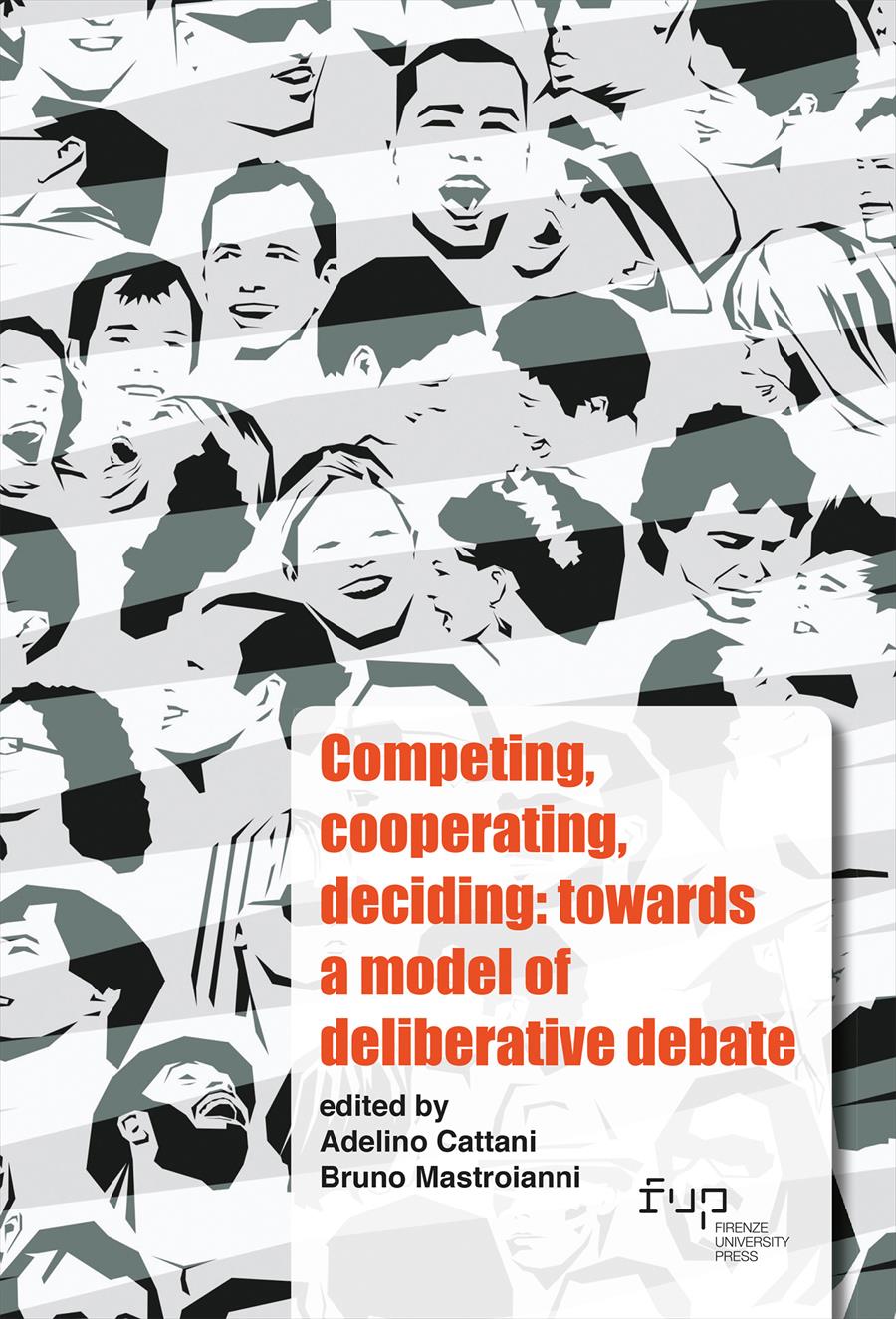- Competing, cooperating, deciding: towards a model of deliberative debate
- Edited by Adelino Cattani, Bruno Mastroianni
From the Virtues of Argumentation to the Happiness of Dispute
- Bruno Mastroianni
- © 2021 Author(s) |
- CC BY 4.0
- DOI: 10.36253/978-88-5518-329-1.04
Efficient debate training should develop the ability to manage real discussions and not just be a laboratory for ideal talks. In this regard, the perspective of the virtues of argumentation is particularly suitable. Virtuous arguing allows the recognition of the other's difference – the contemplation of difference. Using Aristotelian ideas of contemplation as happiness opens up the possibility of accepting the arguers' imperfections and configure disputes suitable for producing shared outcomes, making them genuinely deliberative.
- Keywords:
- Argumentation Theory,
- Virtue Argumentation Theory,
- Delibertive debate,
University of Florence, Italy - ORCID: 0000-0002-5071-762X
- Aberdein, A. 2010. “Virtue in Argument.” Argumentation 24(2): 165-79.
- Aberdein, A. 2014. “In defence of virtue: The legitimacy of agent-based argument appraisal.” Informal Logic 34(1): 77-93.
- Aristotele 1999. Etica Nicomachea. Roma-Bari: Editori Laterza.
- Baldi, B. 2021. Comunicazione politica e società. La semantica del potere. Roma: Carocci.
- Bartezzaghi, S. 2017. “Chi vince non sa cosa si perde.” Aut aut 375 (September 2017). Il Saggiatore: 58-77.
- Berti, E. 1997. Aristotele. Roma-Bari: Laterza.
- Bowell, T., e J. Kingsbury. 2013. “Virtue and argument: Taking character into account.” Informal Logic 33(1): 22-32.
- Cattani, A. 2001. Botta e risposta. L’arte della replica. Bologna: Il Mulino.
- Cattani, A. 2018. “Palestra di botta e risposta: il progetto.” In Palestra di botta e risposta. Per una formazione al dibattito, a cura di Adelino Cattani, 28-9. Padova: Libreria universitaria.
- Cattani, A. 2019. Avere ragione. Piccolo manuale di retorica dialogica. Roma: Dino Audino.
- Cohen, D. 2008. “Now THAT was a Good Argument! On the Virtues of Arguments and the Virtues of Arguers.”, presented to the Centro de Estudios de la Argumentación y el Razonamiento (CEAR), Santiago, Chile, <https://www.academia.edu/43608117/Now_THAT_was_a_g
- Cohen, D. 2013. “Virtue, In Context.” Informal Logic 33(4): 471-85.
- Cohen, D. 2016. “What Virtue Argumentation Misses: The Case of Compathetic Argumentation.” Topoi, 35: 451-60.
- Cohen, D. 2017. “The Virtuous Troll: Argumentative Virtues in the Age of (Technologically Enhanced) Argumentative Pluralism.” Philosophy and Technology 30(2): 179-89.
- D’Errico, F., and I. Poggi. 2010. “Dominance signals in debates.” Human Behavior Understanding January 1: 163-174.
- D’Errico, F., and I. Poggi. 2014. “Aggressive language and insults in digital political participation.” In Proceedings of Multiconference on computer science and Information systems: Web Based Communities and Social Media. 105-14. University of Lisbon.
- Di Valvasone, L. 2019. “Usi figurati di asfaltare. Consulenza linguistica Accademia della Crusca.” <https://accademiadellacrusca.it/it/consulenza/usi-figurati-di-asfaltare/1603> (2020-11-11).
- Foot, P. 1978. Virtues and Vices. Oxford: Blackwell.
- Gascón, J. 2016. “Virtue and arguers.” Topoi 35(2): 441-50.
- Godden, D. 2016. “On the priority of agent-based argumentative norms.” Topoi 35(2): 345-57.
- Goffman, E. 1959. The Presentation of Self in Everyday Life. New York: Doubleday.
- Kidd, I. J. 2016. “Intellectual humility, confidence and argumentation.” Topoi 35(2): 395-402.
- McIntyre, A. 1993 (1988). Dopo la virtù. Saggio di teoria morale. Milano: Feltrinelli.
- Mastroianni, B. 2017. La disputa felice. Dissentire senza litigare sui social network, sui media e in pubblico. Firenze: Cesati.
- Mastroianni, B. 2018. “Scegliere con cura le parole per vivere meglio in rete.” La Nuova Corvina, number 31, December: 96-102.
- Mastroianni, B. 2019. “La “mossa del gattino”: l’autoironia per alleggerire il sovraccarico nelle discussioni online.” ExAgere Rivista n. 1-2 anno IV, January-February.
- Mastroianni, B. 2020. Litigando si impara. Disinnescare l’odio online con la disputa felice. Firenze: Cesati.
- Paglieri, F. 2011. “Enthymematic Parsimony.” Synthese, February: 461-501.
- Paglieri, F. 2015. “Bogency and Goodacies: On Argument Quality in Virtue Argumentation Theory.” Informal Logic, 35(1): 65-87.
- Quattrociocchi, W., and A. Vicini. 2015. Misinformation. Guida alla società dell’informazione e della credulità. Milano: FrancoAngeli.
- Song, Y. 2017. “The moral virtue of openmindedness.” Canadian Journal of Philosophy Volume 48, 2018 - Issue 1: 65-84.
- Watzlawick, P., Beavin J. H., and D. D. Jackson. 1971 (1961). Pragmatica della comunicazione umana. Studio dei modelli interattivi delle patologie e dei paradossi. Roma: Astrolabio.
Chapter Information
Chapter Title
From the Virtues of Argumentation to the Happiness of Dispute
Authors
Bruno Mastroianni
Language
English
DOI
10.36253/978-88-5518-329-1.04
Peer Reviewed
Publication Year
2021
Copyright Information
© 2021 Author(s)
Content License
Metadata License
Bibliographic Information
Book Title
Competing, cooperating, deciding: towards a model of deliberative debate
Editors
Adelino Cattani, Bruno Mastroianni
Peer Reviewed
Number of Pages
168
Publication Year
2021
Copyright Information
© 2021 Author(s)
Content License
Metadata License
Publisher Name
Firenze University Press
DOI
10.36253/978-88-5518-329-1
ISBN Print
978-88-5518-328-4
eISBN (pdf)
978-88-5518-329-1
Series Title
Communication and Philosophical Cultures. Researches and Instruments
Series ISSN
2975-1152
Series E-ISSN
2975-1233
